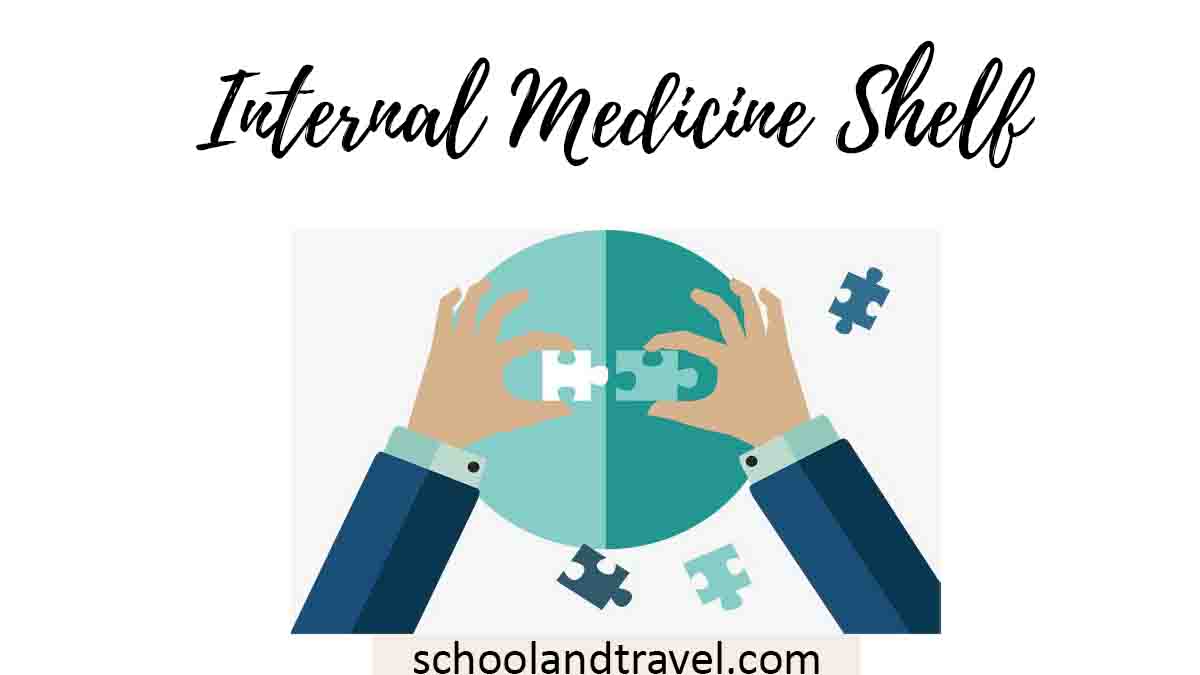The Internal Medicine Shelf is the noblest and purest of all the shelf programs.
The Internal Medicine Shelf is, in all likelihood, the broadest, most comprehensive NBME shelf examination that you may stumble upon at some stage in your clerkship years.
If you have the Internal Medicine Shelf examination fast approaching, well, do not stress; while the Internal Medicine Shelf Exam may appear intimidating or stressful at first, you will do simply great at the exam with the right study plan.
What is the Internal Medicine Shelf?
The National Board of Medical Examiners (NBME) administers the Internal Medicine Shelf exam.
The exam is an essential milestone for all medical students in their medical years. By the time you take the exam, you must have sat for the USMLE® Step 1 and possibly even the Step 2CK tests.
With this in mind, let’s evaluate numerous high yield guidelines and content subjects to help you plan for the Internal Medicine Shelf Exam.
What does the Internal Medicine Shelf Exam examine?
The Internal Medicine Shelf examination examines a student’s practical and mastery application of a common understanding of medicine on older patients.
It is usually taken in the student’s third year in medical school, after the medicine clerkship.
It is also particularly an intensive and challenging examination that covers a wide variety of clinical information.
With that in mind, medical students have to count on dedicating extra studying time to this examination compared to different Shelfs.
The Internal Medicine Shelf examination is quite tough, particularly from the point of view that it comes up in the course of your internal medicine clerkship – a point in time where you are in all likelihood spending a whole lot of your time at the hospital.
This way, whatever spare time you get will have to be invested in studying for the Internal Medicine Shelf.
Key Guides to Know Before Taking the Internal Medicine Shelf Exam
How does the Medical school use the exam:
It is essential to know how medical schools use the exam. Although most medical schools use the Internal Medicine Shelf exam as a factor of students’ average overall performance evaluation and grade, it is beneficial to understand its function in this process.
Similar to the USMLE Step tests, a few students place a higher priority on getting a good score on this evaluation component than studying clinical medicine, which is the exam’s stated goal.
Even if you’re on a medical rotation, make sure you keep a positive attitude regarding the examination.
Read this: Top 10 Jobs For Doctors Without USMLE
Subjects for the Exam:
The board is well-versed in the subjects included in the exam.
It might make every effort to ensure that you are brought up to speed with the content material as quickly as possible, or it could indicate what information you want to study and understand in any case.
However, even in the most rigorous medical rotation, you aren’t possibly going to see all situations covered at the examination or study the whole thing about it; you may need to understand particular diagnoses and treatments.
Consequently, you must do extra study beyond your medical activities to ensure that you have completed key internal medicine subjects to the ideal level.
Moreover, many study packs are available, and the board may make precise suggestions about which study packs to use.
Study during Rotation:
Because the Internal Medicine Shelf exam covers a huge variety of understanding in Internal Medicine, it is most beneficial to study for the exam during the rotation.
Despite your busy schedule, it is best to read throughout the rotation rather than trying to study for the exam for many days.
Learning internal medicine, passing the exam, and keeping up with changes in medicine require a good plan and building a structure and behavior for continual study.
Five Best Study Tips for the Internal Medicine Shelf Exam
1. Start with the easy ones:
During the Internal Medicine Shelf exam, begin with the final ten questions first. The latter questions require greater thinking while preceding questions are less difficult and do not require heavy analysis.
Read this: Triple Major (Meaning, Pros & Cons, Double major)
2. Begin your preparation early:
This may be a lot tougher than it sounds! Often, whenever there is an exam at hand, time does fly faster than you can tell.
In the blink of an eye, it’s exam day, so it is highly advisable to begin preparing for the Internal Medicine Shelf exam sooner rather than later.
The Internal Medicine Shelf has the broadest of testable materials of all Shelf tests and consequently calls for the most important amount of devoted study time.
Thus, spend extra time studying the Internal Shelf materials than the other Shelf. This is particularly applicable to students who will begin their Internal Medicine rotation in their third year at medical school.
3. Balance:
Successfully balancing your medical responsibilities and didactics/book mastering is possibly one of the finest demanding situations that medical college students will face throughout their medical years.
Despite the fact that much of the content on the Internal Medicine Shelf is based on topics studied in pre-med and Step 1, new medical concerns will emerge that go beyond the basic sciences.
These subjects are best learnt at the wards from your patients, residents, and attending.
4. Utilize the appropriate study materials:
Like with all medical colleges and the USMLE Step exams, the materials you choose to study for the Internal Medicine Shelf are almost as essential as the time spent utilizing them.
Fortunately, there is powerful consensus concerning the best study material for the Internal Medicine Shelf.
5. The Long View:
The knowledge you gain during your medical school years will serve you well during your time as a resident, as well as the many years of independent practice that will follow.
The concepts examined on the Internal Medicine Shelf are vital information that all health practitioners should have, as well as a wide range of content.
Consider the time spent reading for this Shelf examination as representing an investment to continue to pay dividends for your patients and your clinical practice for years to come.
By thinking about this material’s long view and incalculable significance, you may channel this motivation into your study behavior and force you to excel.
Conclusion
If along the line you encounter issues of any kind about the Internal Medicine Shelf exam, never be too shy to contact a senior colleague to out to you.
Awesome one; I hope this article answered your question.
Share this Information.
Editor’s Recommendations:
- How to Create a Balanced Plate: The Key to Healthy Eating
- How to Start a Virtual Book Club with Friends
- The Top Credit Score Hacks Every Young Adult Should Know
- The Pros and Cons of Rental Property as a Passive Income Stream
- Enhancing Your Clinical Psychologist Job Prospects with Professional Help
- The Impact of Graphic Design School on Your Future Earnings Potential
- 7+ College Scholarships for Muslim Students (FAQs)
- Flavor of the Month Scholarship 2024 (Requirements, FAQs)
- Vegetarian Scholarship (Requirement, Deadline, FAQs) | 2025
- John and Abigail Adams Scholarship 2022-2024 (Eligibility, Deadline)





